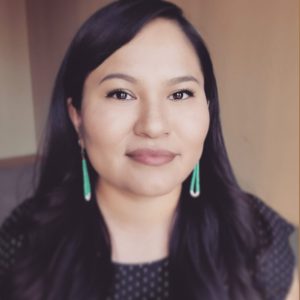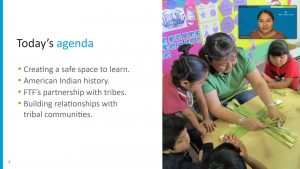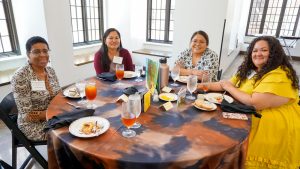Fairness First blog
Researchers voices in health equity
The Fairness First blog represents a space where affiliates why health equity research matters to them, how do they connect to health equity, and what is the value of community engagement in the research process.
May 24, 2023
SHERC Community Expert Board Spotlight: Kalvina Belin
Why I advocate for early childhood health and education in Arizona as a tribal liaison
We are pleased to begin spotlighting members of the new SHERC Community Expert Board as we continue featuring health fairness leaders, researchers, and advocates throughout the Southwest through the Fairness First Blog.

Kalvina Belin is of the Living Arrow Bitterwater clan and born for the Coyote Pass clan. The Tangle people are her maternal grandfather and Bitterwater are her paternal grandfather. And that is how she identifies as a Diné (Navajo) woman. Belin currently serves as the tribal liaison for First Things First (FTF), Arizona’s early childhood agency.
Her main role at FTF is to ensure effective partnership with Arizona’s tribes to better support young children and their families. Belin continues to promote the field of public health, Navajo culture and health research among Indigenous high school students and she previously worked as the lead contact tracer and trainer for the Navajo Nation.
She received her Bachelor of Science in Public Health with a minor in Indigenous health studies and earned her Master of Public Health degree in health promotion with an emphasis in Indigenous Health Track from Northern Arizona University.
Q. How do you define ‘health equity’ or ‘health fairness,’ based on the work you do within your role as tribal liaison for First Things First?
A. It is the vision of FTF that all Arizona’s children are ready to succeed in school and in life. FTF is driven by the mission of creating a family-centered, equitable, high-quality early childhood system that supports the development, well-being, health and education of all Arizona’s children, from birth to age 5.
One of my primary roles in Tribal Affairs is to ensure effective partnership with Native Nations to better support young children and their families. And how we do this is by honoring tribal sovereignty* and recognizing that it is solely up to Native Nations in how they want to participate or engage with FTF.
When looking at this through a health equity lens, it is important to understand that what it means to be “healthy or successful” may look differently for each Native community and recognize that each community has the authority to make decisions on what is best for their children.
*Tribal sovereignty: According to the National Congress of American Indians, “the essence of tribal sovereignty is the ability to govern and to protect and enhance the health and safety, and welfare of tribal citizens within tribal territory.”
Q. What motivated you to pursue the work you are now doing?
A. I’m fortunate to have been raised with Diné traditional values and within a family that honors and practices k’é (Navajo kinship system). I grew up close to my relatives, especially ones beyond the nuclear family definition. Shimásáni (my grandmother), my uncles and my aunts helped raise me. When my mother worked, I stayed with shimásáni in my early years.
This gave me exposure to the language and immersion in cultural activities. Growing up, my biological father was never around, but all of my yaazhs (uncles) played the father figure in my life–each of them instilling different life lessons and lecturing me when needed. It was because of my family, I had a safe and happy childhood and why I have a strong understanding and appreciation of k’é.
Since working in this position, I have learned and whole heartedly agree that the quality of a child’s experience since birth, whether positive or negative, can impact a child’s future. Being raised with a strong foundation of Diné cultural teachings and working within the field of early childhood education, I know now that each of my family members has had a positive impact on who I am today. That is why I’m passionate about the work that I do.
Q. Our communities are made up of different sectors that can influence the health of community members, which can include transportation, education, government, housing, food and agriculture, health and human services—to name a few. What sector(s) of the community do you represent in the work you do, and how does this sector (or sectors) influence health outcomes for the community?
A. When thinking about why early childhood matters and how we work within Tribal Affairs, they both have an impact on health outcomes for children and their families. Research in early childhood education has shown that children with access to high quality early childhood development and health opportunities are more prepared for kindergarten, do better in school, and are more likely to graduate and enroll in college.
They also tend to be healthier. Because of decades of research highlighting the importance of early childhood education, FTF was created in Arizona to fund early education and health programs to prepare young children to succeed. To provide and offer early childhood programs in tribal communities, FTF Tribal Affairs works to support system partners by partnering with Native Nations.

Q. What are some specific health inequities or examples of health injustices that surround your work in advocating for young children in Arizona?
A. The FTF 2022 Regional Impact Reports state that many young children in Arizona face challenges that threaten their healthy development and learning.
One of the inequities highlighted is poverty. FTF’s state Board is responsible for ensuring that early childhood funds are invested in strategies aimed at improving educational and health outcomes for young children. The FTF regional partnership councils, which are made up of volunteers who study the unique needs of the community, have a huge role in greatly informing investment decisions based on the needs of their community.
Examples of strategies that are aimed at supporting young children and their families include:
- Preventive and continuous health care (e.g. food boxes/vouchers, fluoride varnishes, developmental and sensory screenings)
- Strengthening families and early literacy (e.g. home visiting programs)
- Access to high-quality, culturally responsive early care and education
In addition, Tribal Affairs assists in addressing the inequity through tribal consultations to engage tribal leaders to inform our policies, practices and process improvements.

Q. In general, how do you want your work in public health to make a difference or change in this world?
A. This question makes me think of my grandma and the impact she has on me and others. She’s the most caring person I know, she’s always helping others. She prefers traditional medicine over Western medicine. She’s the go to person when we need guidance or teaching about tradition, language, and culture.
Just like my grandma’s example of always helping others, I want my work to make a difference by uplifting our younger generation to learn or utilize their cultural practices and to motivate them to help their community as well.
Q. What is one personal reflection you’ve had regarding your journey in public health and health equity advocacy that you are willing to share?
A. As I reflect on my academic journey to my current job position, I think back on the research topics that I primarily wrote about for assignments or projects that I undertook as a college student. I mainly focused on subjects that I was passionate about. I remember presenting during the NAU undergraduate symposium on a paper that I wrote for my final.
It was a critique of Western research methodologies in a study conducted on adverse childhood experiences within American Indian/Alaska Native communities and how Indigenous methodologies could be implemented in such studies.
And for my graduate research project, I developed a Native American cultural competency training to increase cultural awareness, knowledge and self-efficacy among NAU Health Sciences faculty and the overall goal was to improve the quality of education for Native students. Thinking back on my academic accomplishments, I have come to realize that I’ve come full circle in that my current profession is a combination of both my undergraduate and graduate research.
Q. Self-care is a vital part of our collective work towards health fairness for all (or health equity). What is one thing you do to make sure you are caring for yourself—emotionally, mentally, physically or spiritually?
A. I recently joined the High Altitude Roller Derby (HARD) league and have been participating in the contact sport to not only take care of myself physically but mentally, as well. I’m going to be honest, there are most days when I go to practice intimidated and worried that I will hurt myself. But after the end of each practice, I leave with a clear mind, less stress and more confidence. Roller derby is definitely challenging but rewarding.
Back to the main Fairness First Campaign page.
